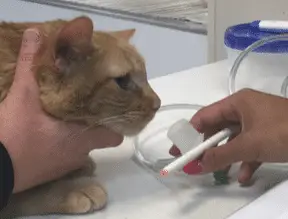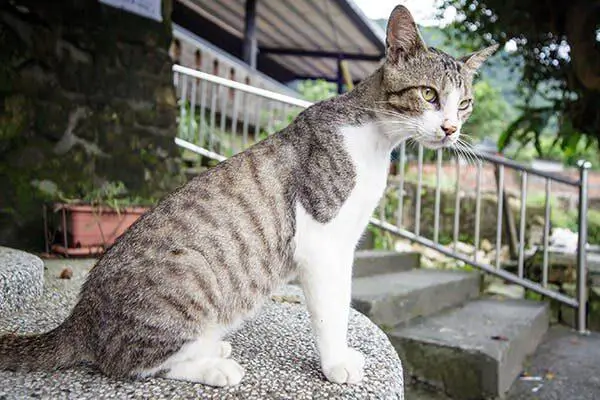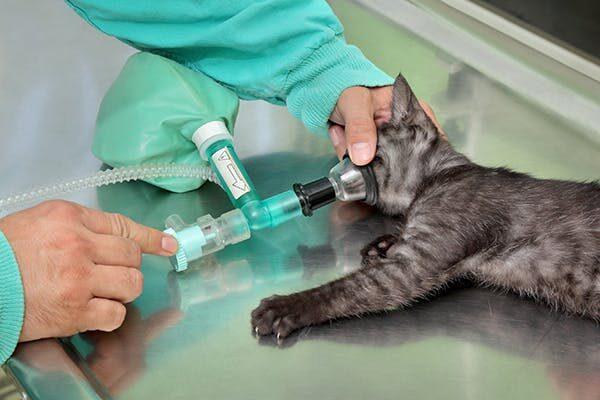Table of Contents
Cat coughing – If you have a pet, you will agree with a quote by Anatole France that talks about how deeply emotionally, and physically you need to be involved in the life of your pet. If you own a cat, you will especially know how much care, patience, time, and commitment is needed to keep a pet safe and healthy. Since you are very emotionally attached to your cat, it is only natural that you will feel concerned if you find your cat suddenly coughing, without any apparent reason. Worry not, in this article we will cover everything on this matter, starting from the reasons behind sudden coughing to the remedies and solutions.
7 Common Reasons Behind Cat Coughing
#1 Feline Asthma

This is not too common, it affects about 1-5% of cats. However, do not be quick to disregard this condition. Though it might be rare, when it does happen, it is quite serious and needs special care and treatment to be cured. According to most specialists, the main cause of Feline asthma is the inhalation of allergens by cats. Now that you know, you can take adequate precautions to keep your furry friend from inhaling something that might be potentially harmful to it.
#2 Respiratory infection

A cat coughing or sneezing, might, more often than not, indicate an infection in the upper respiratory tract. To ascertain if it is actually a respiratory infection or not, you need to look out for other accompanying symptoms. Usually, accompanying symptoms include ulcers in and around the mouth (because of which your cat will have a hoarse voice, or will not be able to speak at all). Also, sniffling, a greenish-whitish discharge from the eyes or nose, or a fever (surfacing because of the lack of appetite) are the other common Symptoms apart from Cat Coughing.
#3 Heartworm

This is a very dangerous, potentially life-threatening disease in cats that occurs more frequently than one would expect, and can prove to be fatal if ignored. So, if you notice cat coughing, it is important that you start paying attention! Preventing heartworms might be a strenuous, difficult, even impossible job since it is passed on by mosquitoes which act as the transmitter of the pathogen.
When your cat is bitten by a mosquito carrying the pathogen, the immature larvae are transferred to your cat’s body and start to grow in the arteries surrounding the heart. When the adult larvae reach the lungs of your cat, is when cat coughing begins. You need to get your cat checked if you believe that cat coughing is a symptom of heartworm in your cat.
#4 Allergic reaction

Your cat might be allergic to certain substances like pollen, or even certain types of food items. If your cat comes into direct contact with or is exposed to any of the substances it is allergic to, it is normal that there will be an allergic reaction. Allergic reactions are mostly manifested in the form of skin itchiness, rashes, head shaking, or most commonly, as cat coughing. To prevent this, you need to be aware of the items your cat is allergic to, and try, to the best of your ability, to keep your cat away from them.
#5 Passing a hairball

A Hairball is basically a ball of fur and hair that collects in the stomach of your cat as a result of the cat licking its fur coat. Passing a hairball is one of the most common reasons behind Cat Coughing. Your cat will need some time for this to pass, you can help it out with a lubricant.
#6 Other parasitic infections

Cats often fall victims to many parasitic diseases which might also be the reason behind cat coughing. Roundworms in the intestines are one of the most common of parasitic diseases. Though these diseases are most often manifested through Symptoms like cat coughing, blood vomiting, and lethargy. However, some infections do not come with external Symptoms, so you need to be extra careful.
#7 A disease of the respiratory tract

Cats can be affected by other respiratory diseases as well like Feline Herpesvirus Type-1, and Cat Flu which mainly target the respiratory tract of your cat. These diseases are mainly manifested through cat coughing, sneezing, wheezing and a watery discharge from the nose. These need to be treated as soon as possible to prevent any further damage.
When should an Owner be Concerned?
Even though your cat coughing might not seem to be a pressing problem prima facie, if you notice the following, you should definitely be concerned as a cat owner:
#1 Your cat is coughing, but there is no Hairball
If you notice your cat coughing without producing any hairball, it might be an indication that it has become a victim of a more serious condition.
Look out for any other symptoms your cat might be showing. If it is coughing regularly, or crouching low with its neck extended upwards, you should know that your cat possibly has asthma, and you should take it to a vet.
#2 Your cat keeps coughing consistently or regularly:
If you notice your cat coughing far longer than it takes for a hairball to pass or an allergy to be cured, it is time to look at the deeper issues. If you notice your cat coughing for a very long time, or coughing regularly for a few weeks, it is time that you arrange for special care for your cat.
Check out the reasons why cat likes boxes?
#3 You notice your cat coughing and producing a wet (productive) cough:
A cat coughing with a wet cough, just like in humans, is more often than not an indicator of disease in the lower respiratory system. In cats, lower respiratory diseases include Cat Flu. By wet cough with regard to cats, one basically means cat coughing accompanied by sputum or phlegm, or a cough accompanied by a watery discharge. Knowing what productive cough stands for, you will know to be concerned if your cat is producing a wet cough.
#4 When you notice your cat coughing and wheezing at the same time
If you find your cat coughing and simultaneously wheezing, that is when you should know that it is having a lot of difficulty breathing. Cat coughing is only accompanied by wheezing when there is a lack of oxygen in the cat’s body, and the cat is struggling to get oxygen in. Do you know what this is a symptom of? Feline asthma. So, it is probably an indication that your cat needs to visit a vet.
#5 When you find your cat coughing and sneezing as well
Think about it from your perspective- When do you sneeze? It is the same for your cat as well. Your cat coughing might mean that it has caught a cold (a viral infection) or a respiratory infection.
#6 You find your cat losing weight
If you see your cat coughing and losing weight at the same time, it is possible that some parasitic pathogen has taken root inside your cat. Before the disease spreads further, you might want to take your cat for a check-up and explore possible remedies.
#7 Your cat’s cough keeps recurring, coming back
If you notice your cat coughing every few hours, or even every few days, it might point to a more serious underlying cause. Say, it is possible that your cat is suffering from asthma or some kind of an allergic reaction. You should start looking for remedies in this case too!
#8 Your Cat is coughing and tongue and gums are turning blue
If you notice your cat’s tongue and gums turning blue along with constant coughing, it is a pretty obvious indicator that your cat is having difficulty breathing. If this is the situation, you need to take your cat to the vet right away.
Treatment for Cat’s Coughing
- Wait for a while: If your cat is coughing for the first time in quite a long time, or coughing for the first time per se, it is probably because it needs to pass a hairball. Wait for some time, and if the coughing spell does not pass, you can look for other remedies.
- Wet Cough: As already mentioned earlier, wet cough is a very clear indication of disease in the lower respiratory tract. If you see such symptoms in your cat, take it to a vet immediately.
- Cough suppressants: If your cat is suffering from a normal cough, the doctor might also prescribe some Cough suppressants to provide relief to your cat.
- For asthma and respiratory diseases: There is various medication available to treat these diseases. Your vet can help you out in this regard. Mostly, corticosteroids are used to treat these diseases and the consequent coughing in cats and are available in oral, injected, and inhaled. However, the inhaled method is most preferred because it is the safest and known to work more quickly and efficiently.
Home Remedies for Cat Coughing
- Keep your cat away from dust smoke and fumes and perfumes, especially if your cat has an asthma problem.
- Look out for and prevent triggers: If you find your cat coughing frequently after exercise, it means that it is suffering from a heart disease that might need immediate treatment.
- Wipe away nasal discharge: When your cat sneezes or wheezes along with coughing, there is a good chance that a watery discharge might be released from the nose or the mouth. Keep wiping away the discharge to keep your cat comfortable.
- Loosen congestion. Steam up your washroom or the kitchen using hot water and place your cat in this environment. It has been proven in many cases to take care of cat coughing.
- Helping to pass hairball: If your cat is coughing because it wants to pass a hairball, making the process easier for it might be a good option. You can use a laxative or a hairball product to aid your cat in passing a hairball.
Frequently Asked Questions (FAQs)
Q1 How long does a cat take to pass a hairball?
It is normal for cats to pass a hairball every few weeks, say every two or three weeks. It varies for different cats, but once every two or three weeks is the standard for a healthy cat. Cats might take anything between a few hours to a few days to release their hairballs.
Q2 How long should I wait if my cat is coughing before taking it to a vet?
It really depends. If your cat is just coughing and you cannot really see any other symptoms, you can wait for hours, or even a few days for it to stop by itself. However, the moment you notice any other symptom aside from the Coughing, like wheezing, sneezing, difficulty breathing, or coughing up blood, you should know that it is important to take your furry friend to the doctor immediately.
Q3 Why does my cat cough even in case of heartworms?
Even though the larvae responsible for heartworms in cats mainly enter the body and go directly to the heart, after maturation, they do travel to the lungs. The presence of adult moving larvae in the lungs and upper respiratory tract is definitely a cause of discomfort and causes the cat to cough. You should take steps to prevent exposure of your cat to the mosquito carrying the larvae, and if it does get exposed, you need to go for proper medication.
Q4 Can you cure cat coughing with just home remedies?
This depends upon the underlying reason behind your cat’s coughing. If your cat is coughing simply because of a hairball, or because of a common cold, you can use the methods suggested above- laxative for hairball and steam for the common cold. However, if your cat is showing other symptoms aside from just coughing, it might be falling prey to a deeper disease and it is best that you seek professional help.
Conclusion
We all love acts. Cat owners, or pet owners in general, feel this emotion more deeply. Thus, it is only natural that if you are a cat owner, you will be worried about seeing your cat cough continuously. The information in this article has been designed to help you navigate through the reasons and proper remedies for Cat coughing. Keep your furry friend healthy, active, and close to your heart!

